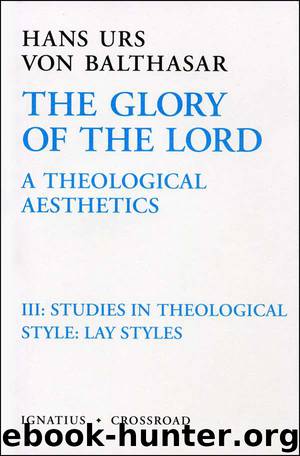The Glory of the Lord, Vol. 3 by Hans Urs von Balthasar

Author:Hans Urs von Balthasar [Balthasar, Hans Urs von]
Language: eng
Format: mobi
Tags: Spiritual & Religion
ISBN: 9781681492018
Publisher: Ignatius Press
Published: 2004-04-21T16:00:00+00:00
2. LOGIC AND METAPHYSICS
Soloviev paves the way toward his system of pan-unity by a preliminary delimitation of the field of philosophical thought. Only the independent subject is capable of self-reflexive philosophising, and this activity contains as much reality as the independent being as such. The subject, however, finds itself belonging to a common, suprapersonal, generic nature, finds itself caught up in a social and political life; and the realities of language and religious expression itself belong of necessity to this social and political life—an individual can as little ‘invent’ them as the individual bee can invent the honeycomb. But the subject also acts beyond and outside himself in aesthetic work, which expresses a more than individual inspiration.49 In the Crisis of Western Philosophy, Soloviev shows the consequences of philosophy’s identification of these suprapersonal relations with the subject itself. Such a move inevitably condemns philosophy to formalism; that is, to confusing the demonstration of the conditions of the possibility of suprasubjective knowledge within the subject with the reduction of what is known to the subject itself. In the late and fragmentary Theoretical Philosophy, the same point of departure appears in radicalised form. Here what is given in the finite subject is strictly reduced to a noesis and a noema conceived, respectively, simply as ‘appearance’ and that which appears; while the positing of the noema as real transcends the whole sphere of what is merely theoretically given and derives in fact from that sphere of act or will, which is also the only thing capable of giving the subject itself its ontic dignity. The separation of the subject from the total cosmic subject and the divine subject is, as it stands, as much a fiction as the act of isolating the phenomenal object from the total interconnectedness of existing reality.
The major currents of Western philosophy—rationalism, from Descartes, by way of Spinoza, Leibniz and Wolff, to Kant, Fichte, Schelling and Hegel; and empiricism, from Bacon by way of Locke, Berkeley and Hume to Mill and Spencer—have absolutised either one aspect or the other of the structure of cognition, either the concept or the experience, and turned a merely formal element into the whole of the reality. This ultimately issues in the identifying of an abstract function with the concrete reality that perform that function; in Hegel everything is reduced to ‘the Reason’, in Schopenhauer everything is reduced to ‘the Will’, in Hartmann to ‘the Unconscious’. But who is it who is rational, who wills, who is unconscious or superconscious? The twofold historical development can be expressed in two syllogisms. For rationalism, the major premise is this: ‘what is truly knowable is known by a priori thinking’ (Descartes to Wolff). The minor premise runs thus: ‘but a priori thinking can know only the forms of our own thought’ (Kant). And so the conclusion is: ‘therefore what truly exists is the forms of our thought; being and concept are the same’ (Hegel). Likewise for the empiricist tradition. The first premise is: ‘what truly exists is
Download
This site does not store any files on its server. We only index and link to content provided by other sites. Please contact the content providers to delete copyright contents if any and email us, we'll remove relevant links or contents immediately.
The Lost Art of Listening by Michael P. Nichols(6472)
Why I Am Not A Calvinist by Dr. Peter S. Ruckman(3769)
The Rosicrucians by Christopher McIntosh(3049)
Wicca: a guide for the solitary practitioner by Scott Cunningham(2704)
Signature in the Cell: DNA and the Evidence for Intelligent Design by Stephen C. Meyer(2501)
Real Sex by Lauren F. Winner(2474)
The Holy Spirit by Billy Graham(2416)
To Light a Sacred Flame by Silver RavenWolf(2353)
The End of Faith by Sam Harris(2287)
The Gnostic Gospels by Pagels Elaine(2026)
Nine Parts of Desire by Geraldine Brooks(2006)
Waking Up by Sam Harris(1958)
Heavens on Earth by Michael Shermer(1954)
Devil, The by Almond Philip C(1899)
Jesus by Paul Johnson(1887)
The God delusion by Richard Dawkins(1848)
Kundalini by Gopi Krishna(1824)
Chosen by God by R. C. Sproul(1760)
The Nature of Consciousness by Rupert Spira(1689)
